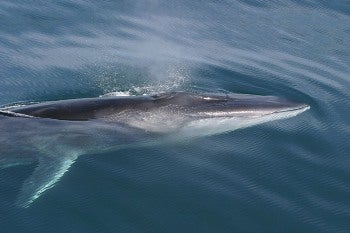
La página que intenta visitar sólo está disponible en inglés. ¡Disculpa!
The page you are about to visit is currently only available in English. Sorry!


A fin whale surfaces. Photo: Lori Mazzuca, NOAA
The International Whaling Commission is currently meeting in Panama, and controversy is already sparking between conservationists and whaling nations looking to increase their catch limits.
Denmark, for one, plans to demand a larger whale catch for Greenland (a Danish territory) at the meeting. The nation argues that current catch levels aren’t enough to meet the nutritional requirements for indigenous people. The proposed increase includes a call for allowing Greenland to catch 19 endangered fin whales per year, almost double its current allowable catch of fin whales.
But conservationists argue that Greenland is already catching more than enough to meet its needs. The Whale and Dolphin Conservation Society recently conducted an undercover investigation where it visited various restaurants to see if they were serving whale meat. It not only found that restaurants were serving the meat, but that it was marketed to tourists. Whale products were also found in supermarkets, seemingly marketed toward tourists.
Greenpeace was among the first groups to bring the plight of the enormous mammals to the public’s attention when it launched its Save the Whale campaign in 1975. Recently, the creatures have received even more buzz thanks to popular television shows such as Whale Wars, now in its fifth season. The marine mammals, which face threats from ship traffic, pollution, and hunting, have dropped in population numbers and so must be monitored carefully.
Japan is also looking to take more whales. At the IWC meeting, representatives of the nation are set to propose an amendment that will allow the country to take minke whales from the Okhotsk Sea/West Pacific for the next five years. In the past, their scientific whaling program has included humpback whales, Antarctic minke whales, common minke whales, sperm whales, Bryde’s whales, and fin whales
At the same time the country is looking to take more whales, Japanese citizens seem to have lost their taste for whale meat. A report recently published on the website of the Dolphin and Whale Action Network in Tokyo stated that the body responsible for selling meat from Japan’s scientific whaling program failed to sell 908 tons of the 1,211 ton catch. That’s 75 percent unsold.
In addition to catch quotas, the IWC will discuss future research on whales and what dangers whales are most likely to face, including pollution and ship strikes.